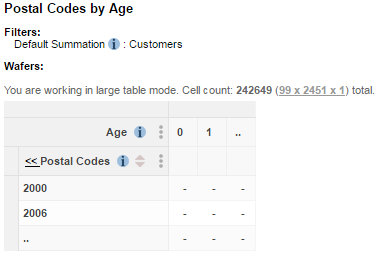Configure Settings for Large Tables - SuperWEB2
SuperWEB2 will automatically switch to large table mode if a user attempts to create a table containing more than a certain number of cells.
By default, the thresholds for large table mode are set at 8,000 rows, 1,000 columns and 10,000 total cells.
Configure Large Table Threshold
To configure the threshold for large table mode:
- Open <tomcat_home>\webapps\webapi\WEB-INF\data\.repository\CubeCatalog.xml in a text editor.
Make a backup copy of this file before making any changes.
-
Locate the following section:
XML<cc:cube totals="true" zerostring="0" nontabulatedzerostring="-" largeTableThresholdTotal="10000" largeTableThresholdRow="8000" largeTableThresholdColumn="1000" ... -
There are three settings you can change:
Parameter SuperWEB2 Will Enter Large Table Mode If... largeTableThresholdTotal
The table has more than this number of cells. largeTableThresholdRow
The table has more than this number of rows. largeTableThresholdColumn
The table has more than this number of columns. - Save your changes to the file and restart Tomcat or the SuperWEB2 service.
Configure the Number of Preview Cells To Show in Large Table Mode
When SuperWEB2 switches to large table mode it shows a preview of part of the table structure. For example:

You can change the number of rows and columns that are shown in the preview. The default is 3, as shown here (the heading for the third row and column shows .. to indicate that there are more rows and columns).
- Open <tomcat_home>\webapps\webapi\WEB-INF\configuration.properties in a text editor.
Make a backup copy of this file before making any changes.
-
Locate the following section:
TEXTtable.largeTableMode.previewDataSize= - Set the value to your preferred number of cells.
- Save your changes to the file and restart Tomcat or the SuperWEB2 service.
You can also change the string that is shown in the last heading for each row and column. By default this is set to ..
-
Open <tomcat_home>\webapps\webapi\WEB-INF\classes\common_labels.properties.
There may be multiple copies of this file for different languages and locales, with names like common_labels_en.properties and common_labels_en_AU.properties. Each one contains the text used for different languages. Depending on which languages are in use on your deployment, you may need to make these changes in multiple versions of the file. The properties file that is used will depend on the language settings in the end user's web browser, the set of supported locales defined in the faces-config.xml configuration file, and the language selected by the user from the drop-down list . See Multilingual and Localisation Support - SuperWEB2 for more information about localisation and how SuperWEB2 uses the properties files.
-
Open the properties file in a text editor.
-
Locate the following parameter:
TEXTtableView.largeTableMode.dots=.. -
Change the value to your preferred string.
- Save your changes and and restart Tomcat or the SuperWEB2 service.
Configure the Maximum Number of Cells in a Table
To configure the maximum number of cells permitted in a table:
- Open <tomcat_home>\webapps\webapi\WEB-INF\data\.repository\RulesEngine.xml in a text editor.
Make a backup copy of this file before making any changes.
-
Locate the following section:
XML<rules:EditRule name="TableCellsNumberRule" applicableOperations="add;drillup;drilldown" implClassName="au.com.str.webapi.services.database.manager.rules.impl.TableCellsNumberRule"> <rules:impl-class-init> <rules:init-param name="maxElementCount" value="40000000"/> <rules:init-param name="disableMaxElementCount" value="false"/> </rules:impl-class-init> </rules:EditRule> - Change the value of
maxElementCountto your preferred maximum number of cells. - Save your changes to the file and restart Tomcat or the SuperWEB2 service.
Prevent Guest Users from Accessing Large Table Mode
If you have enabled guest user access on your system, you may also wish to prevent guest users from accessing large table mode. See Prevent Guest Users from Creating Large Tables - SuperWEB2 for more information on this step.
